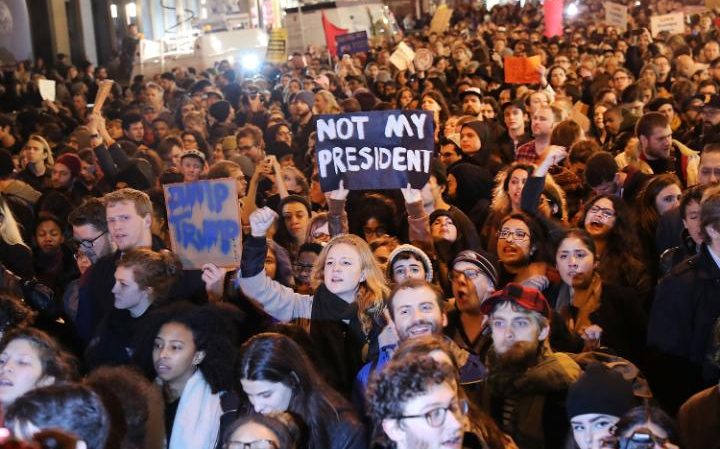Friday
A somber mood settled over our campus on the day after the election, and the silence in the halls reminded me of the silence on 9-11. Many of our students (those who were not Donald Trump supporters) were in a state of shock. It wasn’t just because colleges are traditionally liberal environments. I’ve been at St. Mary’s for previous Republican presidential victories—1984, 1988, 2000, and 2004—and not one of them felt like this.
I’ve mentioned Ralph Ellison’s Invisible Man frequently in past posts and to do so again here. The novel captures the feelings of my students of color, my women students, my neurologically diverse students, my Muslim and LBGTQ and Jewish students. They all were experiencing a sense of erasure, as if they been rendered invisible.
It’s been a challenge to teach during this election season because, even as I want my students to apply literature to the issues of the day, I also strive to avoid taking political sides in the classroom. I have a responsibility to all my students, not just the liberals. To be sure, one can’t teach Geoffrey Chaucer, William Shakespeare, Jane Austen, Charlotte Bronte, Joseph Conrad or Toni Morrison without grappling with issues of gender, class, race, ethnicity, sexual preference, and other hot button issues. One can do so in ways that are not doctrinaire, however.
But how does one skirt politics when one of the candidates is doing everything we tell our students not to do, which is make sweeping generalizations about classes of people? How does one avoid criticizing Trump when he is associating my Latino students with rapists and murderers, my Jewish students with international banking conspirators, and my African American students with hellish cityscapes? What do you do when he mocks a disabled reporter and treats women as his personal play things?
My solution was to never mention Trump by name and to tell the class that, while I had strong political views, I had to be nonpartisan. My insistence on respecting others, while it was an implicit reproof of Trump, was also meant as a call to respect people with different political views. There was a special edge in my calls for tolerance, however. As philosopher Martha Nussbaum notes (I wrote about her in my election day post), the study of literature calls for us to acknowledge the full personhood of others. Her observation took on an air of real urgency.
When Trump won the election, every one of my students in vulnerable populations felt as though the country was giving them a middle finger salute. They had come of age during Barack Obama’s celebration of diversity, they were excited to be voting in their first presidential election, and then the sky fell in, leaving them feeling felt shocked and betrayed.
Maybe the literature that best suits the occasion is stories of people ripped from the warm cocoon of childhood and thrust into the brutal adult world. Flannery O’Connor’s “All That Rises Must Converge” isn’t a perfect choice since the protagonist is an adult son who should have moved out of his mother’s house long ago, but the ending captures his panic when she dies suddenly and he realizes he must confront the world on his own:
Stunned, he let her go and she lurched forward again, walking as if one leg were shorter than the other. A tide of darkness seemed to be sweeping her from him. “Mother!” he cried. “Darling, sweetheart, wait!” Crumpling, she fell to the pavement. He dashed forward and fell at her side, crying, “Mamma, Mamma!” He turned her over. Her face was fiercely distorted. One eye, large and staring, moved slightly to the left as if it had become unmoored. The other remained fixed on him, raked his face again, found nothing and closed.
“Wait here, wait here!” he cried and jumped up and began to run for help toward a cluster of lights he saw in the distance ahead of him. “Help, help!” he shouted, but his voice was thin, scarcely a thread of sound. The lights drifted farther away the faster he ran and his feet moved numbly as if they carried him nowhere. The tide of darkness seemed to sweep him back to her, postponing from moment to moment his entry into the world of guilt and sorrow.
The world is full of guilt and sorrow, my children, and the comforting lights are drifting away. I will do what I can to support you but I can’t save you from it.
Further note: I see that Tim Kaine quoted from William Faulkner’s story Absolom, Absolom in his concession speech: “They killed us, but they ain’t whupped us yet.” Quartz has some smart thoughts about the choice:
It’s spoken by the poor white southern farmer Wash Jones to Thomas Sutpen, the story’s main character.
There’s some irony to the choice of quote, though, that may have been lost on Kaine: the voice of Wash Jones is a stand-in for the socially disenfranchised poor whites of the American south. Jones idolizes the wealthy Sutpen, and clings to him for approval.
